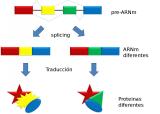
20/01/2015
A new and efficient method discovers switches predictive of cancer
A new publication of the Computational Genomics group of GRIB (IMIM-UPF) led by Eduardo Eyras, has been published in the journal Nucleic Acids Research and explains the results of applying a new computational method to project data from the Cancer Genome Atlas (TCGA) branch funded by the National Institutes of Health (NIH) US project ICGC (International Cancer Genome Consortium). This work represents the first large-scale analysis published, describing alterations in splicing of new cancers using RNA sequencing data from more than 4000 samples.
In this work, they discovered that there exist many splicing switches in patients with the same cancer type and showed that these switches separate with high accuracy tumor and normal samples, and different types of cancer from each other, providing a predictive signature for the disease.
In particular, they provide simple rules based on the expression of a few RNA molecules that would potentially allow determining the cancer type from an RNA sample of a new patient. Additionally, they find similar rules for the triple-negative breast cancer subtype, which is one of the most aggressive subtypes of breast cancer. This new computational method reveals novel signatures of cancer in terms of RNA transcript isoforms specifically expressed in tumors, providing potential novel molecular targets for prognosis and therapy.
Ref. pub.: Sebestyen E, Zawisza M, Eyras E. Detection of recurrent alternative splicing switches in tumor samples reveals novel signatures of cancer", Nucleic Acids Research, 2015; doi: 10.1093 / NAR / gku1392.



